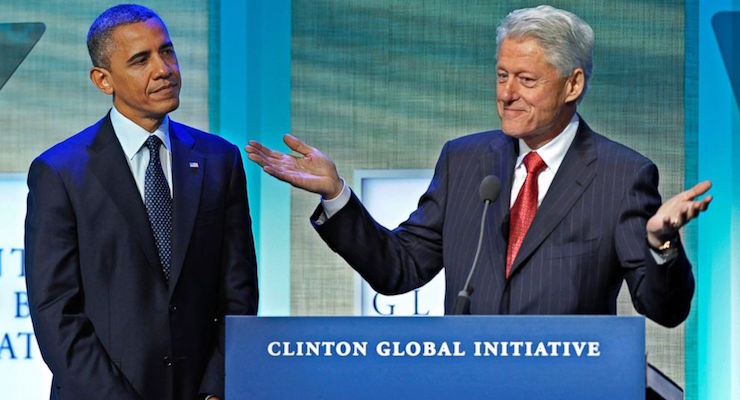

Barack Obama, left, with Bill Clinton, right, at the Clinton Global Initiative. (Peter Foley/Bloomberg via Getty Images)
President Barack Obama promised to have the most transparent administration in history, but instead has set a new record for rejecting Freedom of Information Act requests. According to annual review conducted by The Associated Press, the Obama administration censored materials or rejected FOIA requests in a record 596,095 cases, which represents roughly 77% of the requests.
That’s an increase of 12% since 2009, President Obama’s first year in office, up from 65% prior to his tenure. The numbers include 250,024 instances in which:
- Officials said they couldn’t find records;
- an individual refused to pay for copies;
- the government denied the request as unreasonable or improper.
When those particular scenarios are not considered, which of course is not an accurate account, a significant 93% of all FOIA requests have been at least partially satisfied. The AP review included 100 federal agencies in 2015 and, among those that failed to comply, were the Federal Bureau of Investigation (FBI). The Bureau couldn’t find relevant records to fulfill the requests in nearly 4 in 10 (39%) cases.
The Environmental Protection Agency (EPA), particularly in the regional offices in New York and New Jersey, could not even partially satisfy the requests in 58% of the cases reviewed, while the U.S. Customs and Border Protection Agency failed to fulfill roughly one third of all requests.
The review’s findings echo criticisms heard from government watchdog group Judicial Watch and even news outlets to include The Associated Press and Gawker. Organizations and outlets alike charge agencies under the Obama administration either don’t make much of an effort to find records or intentionally stonewall the requests.
“It seems like they’re doing the minimal amount of work they need to do,” said Jason Leopold, an investigative reporter at Vice News and a leading expert on the records law. “I just don’t believe them. I really question the integrity of their search.”
Other reporters say this is just a piece to a much larger picture painting a lack of transparency, to include how infrequently the president himself steps to the podium to take questions from the press corps. White House spokesman Josh Earnest said Friday he was not familiar with the figures, but tried to turn the tables on Congress.
“Congress writes the rules and they write themselves out of being accountable,” Mr. Earnest said. He urged reporters “to continue the pressure that you have applied to Congress to encourage them to subject themselves to the same kinds of transparency rules that they insist other government agencies follow.”
In fact, Congress has become one of the chief complainers regarding the administration’s stonewall tactics. On Fast & Furious, which was a gun-running scheme that resulted in the death of a border patrol agent, the administration claimed executive privilege, which was later overruled by a federal judge. While investigating Benghazi, the administration withheld documents or blacked out material that was later obtained by private FOIA requests.
When the State Department came up empty-handed in response to a request for emails sent by former Hillary Clinton aide Philippe Reines, the department was sued in federal court. Miraculously, the department managed to locate some 90,000 additional documents its previous search had missed.
The RNC earlier this month joined Judicial Watch, the AP and Gawker when they filed two lawsuits to obtain public records related to Hillary Clinton at the State Department. The FOIA lawsuit was filed in the U.S. District Court for the District of Columbia to compel the State Department to produce records requested in October and December of last year.
As of now, no documents or information have been provided.
The AP review comes towards the end of Sunshine Week, an annual initiative to educate the public about open records acts. Under FOIA, individuals can request copies of government records, which are publicly not privately owned, and the government is generally required to comply with them unless they contain sensitive or classified material.
Yet, despite the results of the this review and others pointing to secrecy, the Obama administration continues to insist that it’s the most transparent administration in U.S. history.







